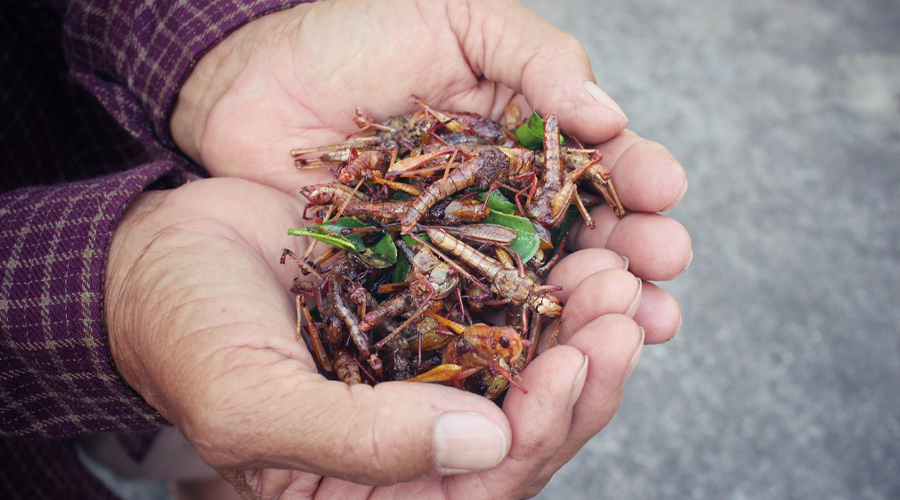Insect Protein: Opportunities for innovation and collaboration in the UK and Africa

This event was organised as part of AgriFood Africa Connect, funded through the GCRF AgriFood Africa programme which is delivered by Innovate UK.
Watch the Insect Protein event sessions on replay
Here’s a snapshot of the key points that were discussed during the event.
Challenges around the growth of insect protein production
We asked our audience their opinion on the main challenges around the growth of insect protein production in the UK and in Africa. Here is what they thought.
Main challenges in Africa
- Funding for research and development
- Funding for scale-up
- Consumer awareness and acceptance
Main challenges in the UK
- Regulation
- Consumer awareness and acceptance
- Funding for research and development
Putting consumers first is key to building consumer awareness and acceptance
We heard from a number of projects looking at strategies to grow awareness and build a viable market for insect based products. In the Sustainable Insect Protein Snack project discussed by Jo Gould, they found that it was beneficial to understand the preferences of consumers and use this to support locally appropriate product development. Shobhita Soor from Legendary Foods in Ghana, is developing inventive products which aim to make insects more appealing to a range of consumers.
When thinking about the feed industry as a consumer of insect protein, Valerie Schuster (Livalta) and Ingrid Lupatch (Agri AB) highlighted that feed components need to be more than just high in protein. Insect protein must be consistent, safe (eg. with no heavy metals), traceable, in reliable supply, available at scale (i.e. 20-50,000 tonnes), competitive in price, responsibly produced (ensuring the wellbeing for producers, environment, livestock and consumers) and of an appropriate consistency to be able to use in feed manufacturing.
Insect protein regulation is important but can be perceived as constraining
In the UK, only live BSF larvae for poultry and insect proteins in aquaculture feed are currently allowed. The feedstocks that can be used are limited to pre-consumer vegetal waste. Thomas Farrugia (Beta Bugs Ltd) gave a clear overview of this and the segmentation we are seeing in the UK insect sector in his talk. Insects as food are regulated in the UK as in the rest of the EU. The European Food Safety Authority (EFSA) has only recently (June 2021) authorised the sale of dried yellow mealworm (the larvae of the beetle Tenebrio molitor).
Sunday Ekesi (International Centre of Insect Physiology and Ecology – icipe) indicated that standards are being developed in various African countries which will support in regulating the growing industry, and enable access to new markets. Michael Lwoyelo from Sanergy reinforced the fact that regulation and the support they receive from government at both a national and local level is crucial to enable Sanergy to scale their facilities and enter new markets.
Continued research is needed to build new innovations
Further research is also essential to exploit all of the nutritional, environmental and welfare benefits insects can offer. The breadth of research required to maximise the potential of the sector was really highlighted by Chrys Tanga (icipe) during one of our panels, with a request for research beyond Black Soldier Fly to continue, as well as further research to develop new processed products. Miha Pipan (Better Origin) talked about the improvements in poultry welfare, gut-health and immunity they are discovering through use of their automated insect rearing modules. Projects such as Locust 4Industry presented by Joshua Ogendo illustrated the value and potential of multi-country collaboration, between both research and industry organisations.
Collaboration is essential in a quickly evolving sector
Betty Kibaara (Rockefeller Foundation) and several other speakers, highlighted that collaboration between everyone, from donors providing catalytic capital, to millers, regulators and research institutions, is needed to grow the sector. Many agreed that collaboration is challenging in a young industry in which intellectual property is also important.
Speakers highlighted many areas where knowledge sharing and collaboration between the UK and Africa could add value. Andrea Jagodic (Mana Biosystems) suggested that knowledge could be shared on automation technologies and environmental control to optimise production, genetic expertise to optimise strains for local conditions, yield and waste streams as well as feedstock recipe optimization, with a focus on health and safety to enable access into global markets, such as for pet food.
It was exciting to hear all of our speakers agree that now is the time to enter the insect industry. It is a dynamic, rapidly growing sector that is eager to find and support new talent and new innovations.
Get in touch to discuss further activities and collaborate around insect protein
Do you have questions or thoughts on what else we could do to support the insect protein industry in the future? Do you want to collaborate with other organisations around insect protein? If so, get in touch with our AgriFood Africa Connect team here.

